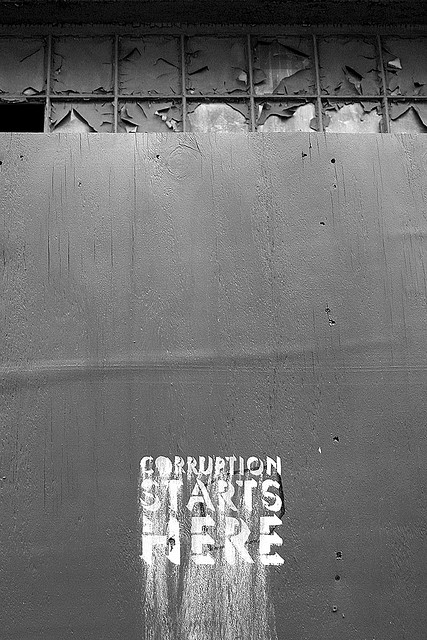Please support our coverage of democratic movements and become a monthly supporter of rabble.ca.
When it comes to corruption, we are so parochial. Gas plants, gas plants, gas plants. (That Twitter parody of Tim Hudak’s “Jobsjobsjobs” was the most sophisticated line of the campaign, IMHO.) You’d think from the hysteria that Ontario is uniquely awful. We aren’t. Corruption is trending globally.
This is different from shrugging it off as an eternal component of human nature. You know: in the Garden of Eden, the snake corrupted Eve, Eve corrupted Adam and so on and so on and scooby dooby dooby. Our age has reinvented corruption and built it into the socio-economic fabric in new ways. Even if evil is rooted in human nature (on which I’m agnostic) public-private partnerships aren’t. Nor are privatization, deregulation and financialization.
For the stink of corruption elsewhere, see Perry Anderson’s recent piece in the London Review. It centres on Italy but careens merrily across Europe, from Ireland to Turkey. It’s almost exhilarating, he gets giddy about the “pervasive corruption of the political class:” versions that are pre-electoral, post-electoral, straightforward theft, faking of credentials — don’t you start feeling less singled out already?
Tony Blair is the avatar, preening in dough like Scrooge McDuck while advising scuzzy Murdoch editor Rebekah Brooks to “tough up.” It’s all fallout from “decades of financial deregulation” and the austerian “regime that has taken hold of Europe.” Italy’s Silvio Berlusconi is a superb case because the thrust of his political leadership was precisely to legislate his own protection from corruption charges, including “sexual corruption” — and hey, there’s Dominique Strauss-Kahn. Then mix in the “technocrat” who illegally succeeded Berlusconi and you can add “corruption of the constitution.” It’s a big picture thing.
Now to India. Economist Prabhat Patnaik, speaking recently at York, said neoliberalism (corporate global rights, privatization, deregulation) leads to corruption because governments give away their national wealth “for a song,” then impose an informal tax on the giveaways so they can maintain power, which sounds like what happened here: the strangest element of gasplantgate is why they paid out so much for the cancellations. But maybe the flowback would have stopped otherwise. Corruption was part of the tale in India’s electoral upheaval as it was in Quebec’s surprise Liberal victory. Voters despair. You can’t turn them out of office fast enough to avoid returning them almost instantly.
And there’s outsourcing, Rob Ford‘s fave, with its half-measure: public-private partnerships. These aim to lower wages, but at the cost of making employees lose hope of moving up the social ladder and possibly needing social assistance — therefore more stress on the public purse. Plus they seem everywhere to lead to executives gorging themselves on public contracts, which is again reflected in Ontario, at ORNGE. Martin Regg Cohn wrote that the most memorable McGuinty “boondoggles” were at such agencies.
You wouldn’t have those CEO pig-outs absent neo-liberalism’s moral model: get rich not just quick but hugely. As Kevin O’Leary loves saying, and CBC plasters on its promos: God put us here to get rich. Note it’s a public broadcaster where he barks that and no one contests it. (I consider Amanda Lang’s ripostes pro forma.)
Since there’s no counter model (excluding, maybe, the pope) it becomes almost embarrassing not to grab for all you can get, legality be damned. The mentality seeps into areas like pro sports and the World Cup, with PED corruption, game fixing — and trickles down to kids. There’s also a sort of pre-emptive political corruption, where leaders like Bill Clinton and Barack Obama have their eye on the vast returns available after they leave office, through their own foundations, etc., as long as they don’t offend the corporate titans who are the donors. But none of it would thrive without the grotesque, tantalizing wealth inequalities that equate with neoliberalism.
Why anyone thought privatizing huge chunks of public wealth and letting the profit motive slither all over them would mean less corruption evades me, along with thinking Ontario’s Liberals are the beginning and end of the problem. Corruption may always be with us but it comes in different forms. We’re currently driving the globalization-privatization model right off a cliff.
This column was first published in the Toronto Star.
Photo: IntangibleArts/flickr



